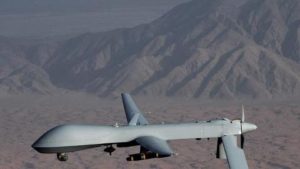
Africa has seemingly always endured a higher burden of conflict than other parts of the globe, and while drone strikes might be seen as a way to alleviate that, there is growing evidence to the contrary. As Western interests, led by the United States, increase their role in counter-terrorism efforts from Libya to Nigeria, leaders across Africa must question the wisdom of allowing weaponized drones on their sovereign territory.
In October 2015, The Intercept published a feature titled “The Drone Papers,” which provided a comprehensive assessment of the U.S. program. It also contained a section detailing the surprising scope and scale of U.S. drone activity across Africa. Drawing on reporting from The New York Times, Foreign Policy, the Washington Post and leaked Pentagon documents, the feature calls attention to the 14 African locations that are currently used to house and operate these sophisticated but nevertheless blunt instruments of warfare.
The U.S. strategy in Africa revolves around a ‘spoke-and-hub’ approach, with the hub being Camp Lemonnier in Djibouti. Camp Lemonnier is no flash in the pan for the U.S. Department of Defense. It is the headquarters of the Combined Joint Task Force-Horn of Africa, which General Ham, the former commanding officer of the U.S. Africa Command, described as an ‘essential regional power projection base that enables the operation of multiple combatant commands.’
Since 2012, nearly $1.2 billion has been approved for expansion of the base, and the number of personnel at Camp Lemonnier has increased by roughly 450% since 2002. Furthermore, the U.S. signed a $70 million annual lease agreement with the government of Djibouti to continue operations through to 2044. Clearly the Pentagon has long-term plans for Camp Lemonnier, which it views as ‘as a key location for national security and power projection.’
Arguments in favor of increased drone strikes are relatively straightforward. Drone attacks eliminate dangerous terrorists without the need for a heavy U.S. footprint and, more important, without putting actual troops or pilots in the line of fire. Because drones are operated remotely, soldiers are kept out of harm’s way, which helps minimize casualties.
A popular concern about drone strikes, which is highlighted and explained in “The Drone Papers,” is that roughly 50% of strikes rely only on signals intelligence. SIGINT relies almost exclusively on communication received from computers and mobile phones to locate presumed terrorists, often without human assessment of the integrity of the interceptions. In these cases, there is very little understanding about who is killed, or the context in which the attack is taking place.
African leaders should insist on independent inquiries in the event of civilian causalities
Read more at www.allafrica.com

